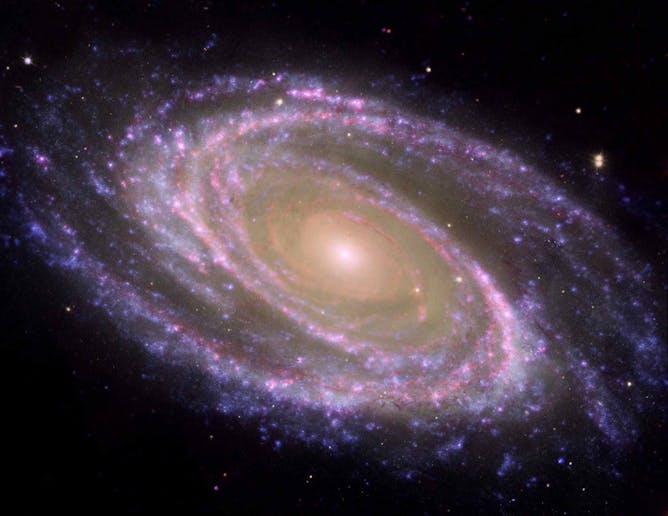|
|
|
Editor's note
|
|
When news emerged that an Israeli spacecraft carrying microscopic near-indestructible lifeforms called tardigrades had crashed into the moon, people excitedly started calling it a colonisation. After all, tardigrades can survive pummelling by extreme pressure and radiation and potentially live for over 100 years without food, water or oxygen.
The problem is that only happens when tardigrades enter a spore-like state that slows their metabolism down a hundred-fold. They might survive, but you wouldn’t call it living. Unless we rescue the tardigrades, they will ultimately die. And I can’t see anyone sending astronauts to scrabble around the moon with a microscope to collect them.
But there’s a serious issue here. Every mission to the moon leaves something behind. Now we’re littering it with doomed tardigrades. If we’re not careful, the moon will become little more than a dumping ground for our space junk. And, as Monica Grady writes, the stakes will be higher if we start doing the same thing to other planets.
Looking further out into space, scientists think they may have worked out why spiral galaxies are symmetrical even when they’re over half a million light years across. And instead of resorting to using the theoretical mystery substance dark matter to fill the holes in their equations, they’ve come up with an explanation that is similar to a 400-year-old idea that the astronomer Johannes Kepler had about snowflakes.
|
Stephen Harris
Commissioning + Science Editor
|

|
|
Top stories
|

3DStock/Shutterstock
Monica Grady, The Open University
An Israeli spacecraft carrying tardigrades crashed into the moon. Whether they will survive is irrelevant.
|

Sepp photography / shutterstock
Anna Krzywoszynska, University of Sheffield
The 'tractors and chemicals' recipe for farming has let human populations boom, but left us with degraded soils.
|

M81 spiral galaxy.
NASA/JPL-Caltech/ESA/Harvard-Smithsonian CfA
Chris Jeynes, University of Surrey; Michael Parker, University of Essex
New research does away with dark matter by putting 'entropy', a measure of disorder, at the heart of the universe.
|
Health + Medicine
|
-
Andrew George, Brunel University London
Science is rarely about an individual genius saving the day.
-
Alison Murray, University of Aberdeen
Automated decision making has been around in healthcare since the 1970s, and now radiology is the new frontline where AI is being deployed.
-
Emily Lowthian, Cardiff University; Simon C Moore, Cardiff University
Parents' substance use affects children's physical, psychological, cognitive, social and economic well-being, a new review of the research has found.
-
Tony Rao, King's College London
Specific challenges must be addressed in the older population who are at risk from alcohol abuse.
|
|
Business + Economy
|
-
Andrew Crane, University of Bath; Christian Voegtlin, Audencia; Laura Noval, Imperial College London
What they say about big issues may be a clue to the working environment they run.
-
Máire O Sullivan, Edge Hill University
Multi-level marketing schemes promise easy money and a supportive community. But that's often not how they pan out.
-
Federico Winer, Loughborough University
Esports is huge business, attracting millions of players and huge tournament prizes. But investors are worried about the level of hype in the industry.
|
|
Politics + Society
|
-
Kamran Khalid, University of Sydney
For decades, the Indian state of Jammu and Kashmir had a special status, with its own constitution, flag and the ability to make its own laws.
-
Sarah Campbell, Newcastle University
Some of Northern Ireland's biggest problems have nothing to do with leaving the EU, but all anyone talks about now is the backstop.
|
|
Education
|
-
Lars-Erik Malmberg, University of Oxford; Andrew J. Martin, UNSW
Study shows how to help students achieve their full potential.
|
|
| |
Featured events
|

|
Rewley House, 1 Wellington Square, Oxford, Oxfordshire, OX1 2JA, United Kingdom of Great Britain and Northern Ireland — University of Oxford
|

|
Institute of Mental Health, University of Nottingham Innovation Park, , Nottingham, Nottingham, NG7 2TU, United Kingdom of Great Britain and Northern Ireland — University of Nottingham
|

|
34 Broad Street, Oxford, Oxfordshire, OX1 3BD, United Kingdom of Great Britain and Northern Ireland — University of Oxford
|
|
|
|
| |
| |
| |
| |
| |
|
|
|
|
|
|
|